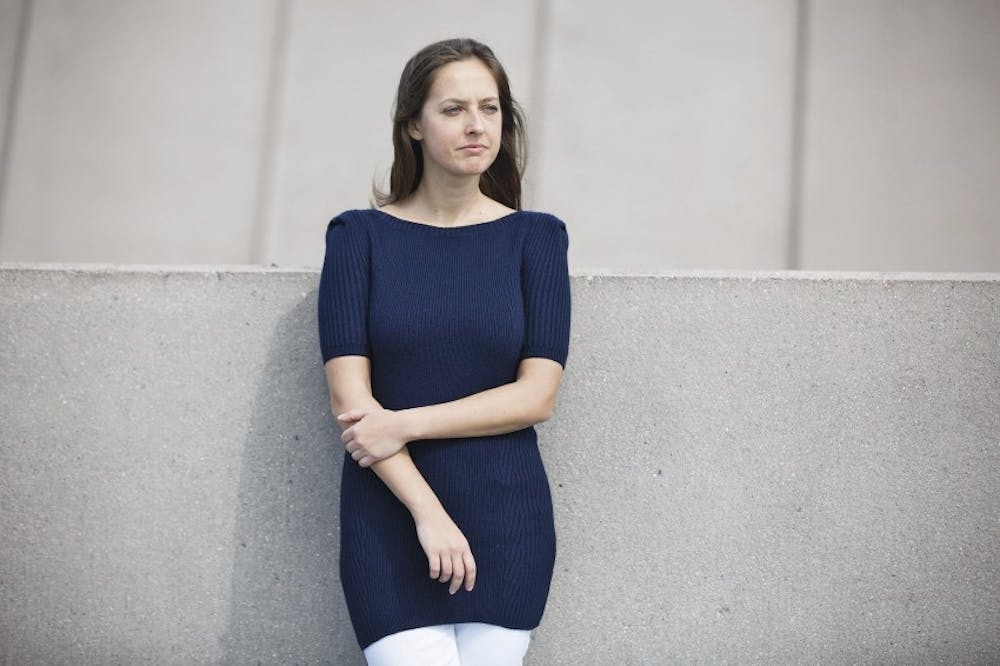Editor’s Note: In her talk, Kristina Anderson said she never calls the shooter by name in order to limit notoriety. Anderson also asked that the name not be written in The Collegian's article. The shooter will be referred to as "the shooter" or "the perpetrator."
On April 16, 2007, a 23-year-old shooter killed 32 people and injured 17 more on the Virginia Tech campus before taking his own life. On February 5, 2018, Kristina Anderson, 30, a survivor of the tragedy, spoke to the University of the Richmond about her story.
Anderson said she remembered the day vividly. She remembers having trouble deciding which shoes to wear that morning. She remembers the stern look from her teacher as she entered the room a few minutes late. Anderson had quickly found a seat in the back of Norris Hall Classroom 211. Little did she know that moments later, her life would be changed forever.
Anderson’s professor and 11 of her peers were murdered in Room 211 that day. The perpetrator shot Anderson three times before taking his own life in the front of the classroom. Anderson was one of the most critically injured survivors of the tragedy.
Most of Anderson’s left kidney was removed, in addition to her gallbladder. After months of physical therapy and living in her family’s first-floor guest room, Anderson could walk again, according to The Chronicle of Higher Education. Although her physical wounds healed relatively quickly given the circumstance, the trauma lingered.
“I didn’t want to hear that I would get over it or that it would get better because I knew I would always remember the day I was shot in a building,” Anderson said. “Counseling was a big part of my recovery. I needed to essentially dump the hardest parts of the experience to someone who was trained and educated to give me critical feedback.”
In her presentation, Anderson shared intimate details about the 11-minute shooting, some of which are not included in common pieces of news and literature. The room was silent as Anderson played a live cell phone video from outside Norris Hall on the day of the shooting and showed a photo of herself being carried out of the building.
“One thing that was especially powerful was Kristina’s conscious effort to never mention the shooter's name and instead to focus on the brave actions of the victims of the attack,” Peyton McGovern, sophomore, said. “I thought she did an excellent job, as she was honest and open to all questions. She clearly cared about the safety of everyone in the room.”
Although not her original life plan, Anderson has since dedicated her life to helping schools, organizations and law enforcement better prepare for situations similar to that at Virginia Tech. Her foundation, the Koshka Foundation, focuses on bystander intervention, active shooter response and violence protection.
“I first started speaking with law enforcement, where I finally felt that my story was being used for a positive good and to help train and educate people,” Anderson said. “I don’t want it to be just an emotional story that is told. I think it needs to be used for some greater change of behavior, education and awareness.”
URPD Operations Lt. Alfred Johnson also spoke at the end of Anderson’s talk to ensure that students at UR knew what to do in the event of suspicious activity on campus.
“I believe it’s important for students to understand that events like this can happen anywhere at any time and we must be prepared," Johnson said. "I think hearing this from a survivor, rather than faculty or staff, really hit home for students."
Enjoy what you're reading?
Signup for our newsletter
The URPD uses UR Alert to provide critical safety information to students, faculty and staff in the event of an emergency. Additionally, URPD encourages students to use the LiveSafe mobile app, co-founded by Anderson, which allows users to alert police of suspicious activity discreetly.
“LiveSafe is now at over 100 college campuses around the country," Anderson said. “It was created out of the need for a new tool that allowed students to communicate with local campus police."
Anderson closed by saying the shooting at Virginia Tech was not unique and could happen here.
“This can happen anywhere and that is scary to admit, she said. "We have learned a lot since Virginia Tech, but there is always room for growth and improvement."
Contact contributor Kim Smith at kim.smith1@richmond.edu.
Support independent student media
You can make a tax-deductible donation by clicking the button below, which takes you to our secure PayPal account. The page is set up to receive contributions in whatever amount you designate. We look forward to using the money we raise to further our mission of providing honest and accurate information to students, faculty, staff, alumni and others in the general public.
Donate Now



